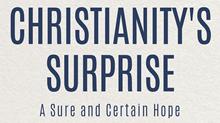Britney Spears as a Theological Reflection

Britney Spears as a Theological Reflection
#FreeBrittany
If you have been watching the news or following pop culture at all, you may be familiar with the #FreeBritney campaign. The campaign #FreeBritney is trending in response to pop singer Britney Spears winning a small victory in her appeal to have her conservatorship shared between her father and a financial institution. This appeal is designed to give her father less power in her financial affairs. He gained control over her estate when Spears was declared unfit in 2008 due to mental illness.
For a summary of the saga, go here: https://www.cbsnews.com/news/britney-spears-conservatorship/
#FreeBritney
The Spears saga is a complex one that involves a high profile celebrity who began her career on the Mickey Mouse Club, went on to become a pre-teen/teen pop sensation. Not long after she outgrew her Mickey ears, she became the scrutiny of every news outlet and gossip media source. She was quickly declared an un-fit role model to young girls because of how she expressed her sexuality. Through the years, as her life began falling apart, she was harassed by the media as she went through a divorce and a child custody battle. She received cruel commentary about her weight and her eventual hair choices (she shaved her head). And this went on for decades. In the midst of it she received treatment for a mental illness (understandably?) and through that was declared unfit to manage her own life and finances. This is when led her father stepped in (who had been un-involved in her life up to this point) to become her “conservator.” Now, decades later, Britney Spears wants control of her life and her finances back. And much of America agrees and believes it is time.
Women in American Society
There is much to be said about the #FreeBritney campaign. For one, how the media and American society de-humanizes celebrities, harasses them, then glorifies their pain. What is of interest to me, however, as a Christian, a pastor and a woman is how Britney Spears’ story is paradigmatic for so many women who feel trapped by the controls of the society and church in which she inhabits. In this sense, she too is seeking freedom.
Consider the black woman, who possesses the least amount power in society. She is expected to be strong, un-feeling and to carry the weight of the world on her shoulders without complaining about it. Did you know that African American women are three times more likely than white women to die a maternal death? (https://www.ajmc.com/view/racial-disparities-persist-in-maternal-morbidity-mortality-and-infant-health) When she is in pain, she is statistically less likely to be believed. When she demands a diagnosis, she is given arbitrary answers about losing weight. She carries the impact of her ancestral history and trauma within her physical body and it is literally killing her. She is trapped by society’s norms that put her at the lowest of the proverbial ladder with the least amount of power. She is seeking control over her own life. She is longing to be free from the chains of systemic racism, poverty and discrimination.
Consider the woman sexually victimized and when she told the truth, she was not believed. She is looking for freedom from the patriarchy that protects the perpetrator and blames the victim.
Consider the women who works outside the home. We are expected to be bold and confident yet not come off too strong. We grow up hearing messages from every corner of our culture. Messages like “Be thin but not too thin.” “Be strong but not too strong.” “Be compassionate but not emotional.”
Consider the single woman who is expected to be worthy of a man’s pursuit and also coy and mysterious.
The expectation to strike the perfect balance between all extremes lies in the heart of every woman. We are seeking control over our own lives. We are seeking freedom.
Women in the Church
The church is equally, if not more, guilty than society and culture at large for seeking to control women, insisting that she “sit still, look pretty and know her place.”
Ever since we blamed Eve (Adam blamed Eve?) for eating the forbidden fruit, we have been trying to control her; suspicious of her capacity to manage her own life. According to the traditional interpretation of the Genesis story, she cannot be trusted. She is too emotional. She needs a man to stand beside her and keep her in check. Cover her up. Silence her. Take control of her because she is unfit to control herself.
In the church, she has often been ex-communicated for wanting to preach and yet she is looked down upon if she doesn’t serve enough Sundays in the Children’s ministry. She is told to submit to her husband and do it joyfully, regardless of her skill or competence. She is told to let her husband lead even if she is stronger, more knowledgeable or capable in a given area. She is expected to manage her household but not run it. Many of us today are looking for freedom from these man-made systems and expectations.
Personal Example
I remember, as a young married woman, I attended a ladies bible class taught by older women in the church. It was designed to be a sort of mentoring program. The classes they taught included how to cook, decorate your table, and how to make your husband feel respected. On this particular week, a woman in her 60s was leading the class. She was talking about the differences between men and women. To summarize her points, women need connection through conversation and men need…well, sex. She explained how when her husband came home from work on his lunch break she had a hot lunch waiting for him on the counter. After lunch, although she desired to talk to him and connect with him, she honored his request to not talk to him at all, and instead to stay quiet while he took a short nap before returning to work. This was her way of honoring him. This sacrifice of her own needs was her God-given mandate as his “help-meet” (a horribly ridiculous term many of these women used based on a Christian author’s book on patriarchy called “Created to be His Helpmeet”). At the time, I remember being offended and even laughing about this ridiculous example with other young women. And at the same time, I experienced a deep sense of shame as I realized this would never be my story. I would not be home if my husband ever came home for lunch. I would be working. I would not neglect my own needs in my marriage, (nor would my husband ask me to). I experienced shame because my church community and the leaders all around me affirmed this model of headship. At the time, everyone around me agreed that this woman, and her example, were indeed the picture of Godliness and the highest achievement for a Christian woman. I began looking for freedom from toxic church cultures who insisted on women neglecting their own needs while being silent and submissive.
The conservatorship of Britney Spears is paradigmatic for the experience of women in society and the church today to varying degrees. We, as a society, are recognizing the oppressive behavior of the people in power over those with less power. This points us to all the places in our lives where we are being controlled, where we are being silenced, where we are being asked to fit in a box. In saying #FreeBritney, we are recognizing a deep need for freedom within ourselves, our society and our Churches.
It is past time to #FreeBritney
Jesus Creed is a part of CT's
Blog Forum. Support the work of CT.
Subscribe and get one year free.
The views of the blogger do not necessarily reflect those of Christianity Today.




















